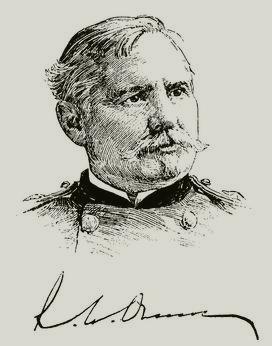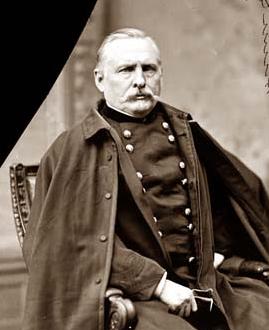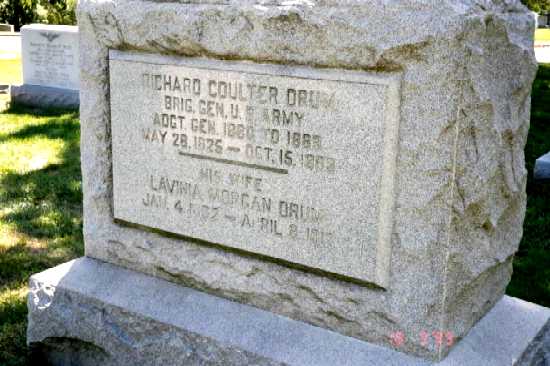Courtesy of Appleton’s Enclclopedia:
Richard Coulter Drum, soldier, born in Pennsylvania, 28 May 1825. He studied at Jefferson College, entered the army as a private in the 1st Pennsylvania volunteers on 8 December 1846, was engaged at the siege of Vera Cruz, and appointed a Second Lieutenant of U. S. infantry on 18 February 1847. He was brevetted First Lieutenant for bravery at Chapultepec and the capture of the City of Mexico.
After the war with Mexico he was transferred to the artillery, was engaged in the action at Blue Water, Nebraska, served as aide-de-camp to General Harney in the Sioux expedition, and was in Kansas during the troubles of 1856. From 1856 till 1858 he served as acting assistant adjutant general at the headquarters of the Department of the West, and subsequently as adjutant in the artillery school.
At the beginning of the Civil War he was appointed Assistant Adjutant General of
the U. S. army, and promoted to Captain on 14 May 1861, Major on 3 August
1861, and Lieutenant Colonel on 17 July 1862. On 24 September 1864, he was
brevetted Colonel, and on 13 March 1865, Brigadier General for services during
the war.
He continued in the Adjutant General’s Department, was stationed in 1866-1868 at Philadelphia, in 1868-69 at Atlanta, the headquarters of the Department of the South, receiving promotion as Colonel on 22 February 1869, and on 15 June 1880, he succeeded General Townsend, on the latter’s retirement, as Adjutant General of the Army, with the rank of Brigadier General.
His elder brother, Simon Henry Drum, soldier, born in Greensburg,Westmoreland County, Pennsylvania, in June 1807; killed in action at the storming of the City of Mexico, 13 September 1847, was graduated at the U. S. Military Academy in 1830. He was assistant instructor of infantry tactics there in 1830-32, was engaged in the Florida war and the Canada border disturbances, and as Captain of Artillery in the occupation of Texas in 1846 served through the Mexican war, distinguished himself at Contreras, where he recaptured two fieldpieces taken from his regiment at Buena Vista, and fell at the assault on the City of Mexico after he had entered the Belen gate while directing the fire of a gun he had captured.
NOTE: Another relative, William Findlay Drum, Lieutenant Colonel, United States Army, is buried adjacent to him in Arlington National Cemetery.
- Richard Coulter Drum of Pennsylvania
- Appointed From Pennsylvania, Private, Company K, 1st Pennsylvania Infantry, 16 December 1846 t 17 March 1847
- Second Lieutenant of Infantry, 18 February 1847
- 9th United States Infnatry, 9 April 1847
- Transferred to the 4th United States Artillery, Mar 1848
- First Lieutenant, 16 September 1850
- Brevet Captain, Assistant Adjutant General, 16March l861
- Major, Assistant Adjutant General, 3August 1861
- Lieutenant Colonel, Assistant Adjutant General, 17 .July 1862
- Colonel, Assistant Adjutant General, 22 February 1869
- Brigadier General, Adjutant General of the Army, 15 June1880
- Brevet First Lieutenant, 13 September 1847 for gallant and meritorious conduct in the Battle of Chapultepec Mexico
- Colonel, 24 September 1864 for meritorious and faithful service during the Civil War and Brigadier General, 13 March 1865 for faithful and meritorious service in the
- Adjutant General’s Department during the war.
- Retired 28 May 1889
If Judge Thomas Gibbes Morgan’s eldest son stayed within the Union lines because he would not sanction Secession, his eldest daughter – Lavinia – was on the Federal side also, married to Colonel Richard Coulter Drum, then stationed in California,
and destined to become, in days of peace, Adjutant-General under President Cleveland’s first administration. Though spared the necessity of fighting against his wife’s brothers, Colonel Drum was largely instrumental in checking the Secession movement in California which would probably have assured the success of the South.
The Drum family was a very noted one in this county (Westmoreland County) in the last century. Augustus Drum was a grandson of Simon and a son of Simon Drum. Jr., the latter being well remembered in the early history of Greensburg as its old-time postmaster, a position from which he was retired with the election of William Henry Harrison in 1840, after almost a lifetime of service. Among other prominent men, he was on the funeral committee of Gen. Arthur St. Clair in 1818.
Three of his sons became prominent. Simon H. Drum was a graduate from West Point in the class of 1830 and was killed at Garita De Belen, in the Mexican war, September 13, 1847. Richard Coulter Drum, his youngest son, was also in the Mexican war, and afterwards, by gradual promotions, reached the position of adjutant general of the United States army. He was the only man in our country’s history who filled that position who had not been educated at West Point.
Augustus Drum was the sixth son, born in Greensburg November 26, 1815, and was educated at Jefferson College. He read law with Alexander W. Foster and was admitted to the bar in 1836. He was a man of medium height and build, with brown hair and blue eyes. Not long after his admission to the bar he was married to Isabel, a daughter of Daniel Stannard, of Indiana, Pennsylvania, and for many years, after the prevalent custom of that day, practiced in both Indiana and Westmoreland counties. In Indiana he was a politician and leader of the Democratic party, but in Greensburg was mostly renowned as a lawyer and excelled in his addresses before a jury. He was the same age as Cowan and Burrell, and in his profession advanced so rapidly that at the age of forty he easily ranked with the first lawyers of the bar.
Late in the forties he represented his district in the state senate of Pennsylvania. In 1852 he was the candidate of the Democratic party for congress and was elected after a spirited contest over a number of opponents. A song was improvised and sung widely by his friends, with a stanza for each opponent. The last of each division was: “He’ll be left at home because he can’t beat a Drum.”
BRIGADIER GENERAL R. C. DRUM DEAD
Famous Indian Fighter and Ex-Adjutant General of Army
WASHINGTON, October 15, 1909 – Brigadier General Richard C. Drum, USA, retired, a veteran of the Civil War and for many years Adjutant General of the Army, died this morning in Drummond, Maryland, from diseases incident to old age.
Richard C. Drum was born in Greensborough, Westmoreland County, Pennsylvania, on May 28, 1825. He enlisted as a Private at the outbreak of the Mexican War, participating in the battles at Contreras, San Antonio and the capture of the City of Mexica. At the close of the war he was a Lieutenant in the regular army.
Between that time and the succession of South Carolina Lieutenant Drum spent most of his time in fighting against the Indians.
In the following year Major Drum – he now attained this rank – was ordered to the Pacific Coast, where he spent the next ten years directing the campaign against numerous Indian tribes there. He so attached himself to the people there that when the War Department ordered him East in 1866, the citizens paid the debts he had contracted in the service of his country and presented him with $30,000.
On returning to the East Major Drum served in New York City in the headquarters of the Third Military District. He became Colonel in 1869. In 1878 Colonel Drum was ordered to Washington for duty with the Adjutant General’s Department. On the retirement of General Edward D. Townsend in 1880, General Drum was promoted to Adjutant General. During his administration in this office General Drum created a general stir in the circle of the Grand Army men when he made a proposition to return to the Southern States the flags captured from them during the Civil War.
DRUM, RICHARD C
- BRIG GEN U S A RET
- VETERAN SERVICE DATES: Unknown
- DATE OF DEATH: 10/15/1909
- DATE OF INTERMENT: Unknown
- BURIED AT: SECTION OFFRS SITE 1776
- ARLINGTON NATIONAL CEMETERY
Michael Robert Patterson was born in Arlington and is the son of a former officer of the US Army. So it was no wonder that sooner or later his interests drew him to American history and especially to American military history. Many of his articles can be found on renowned portals like the New York Times, Washingtonpost or Wikipedia.
Reviewed by: Michael Howard



